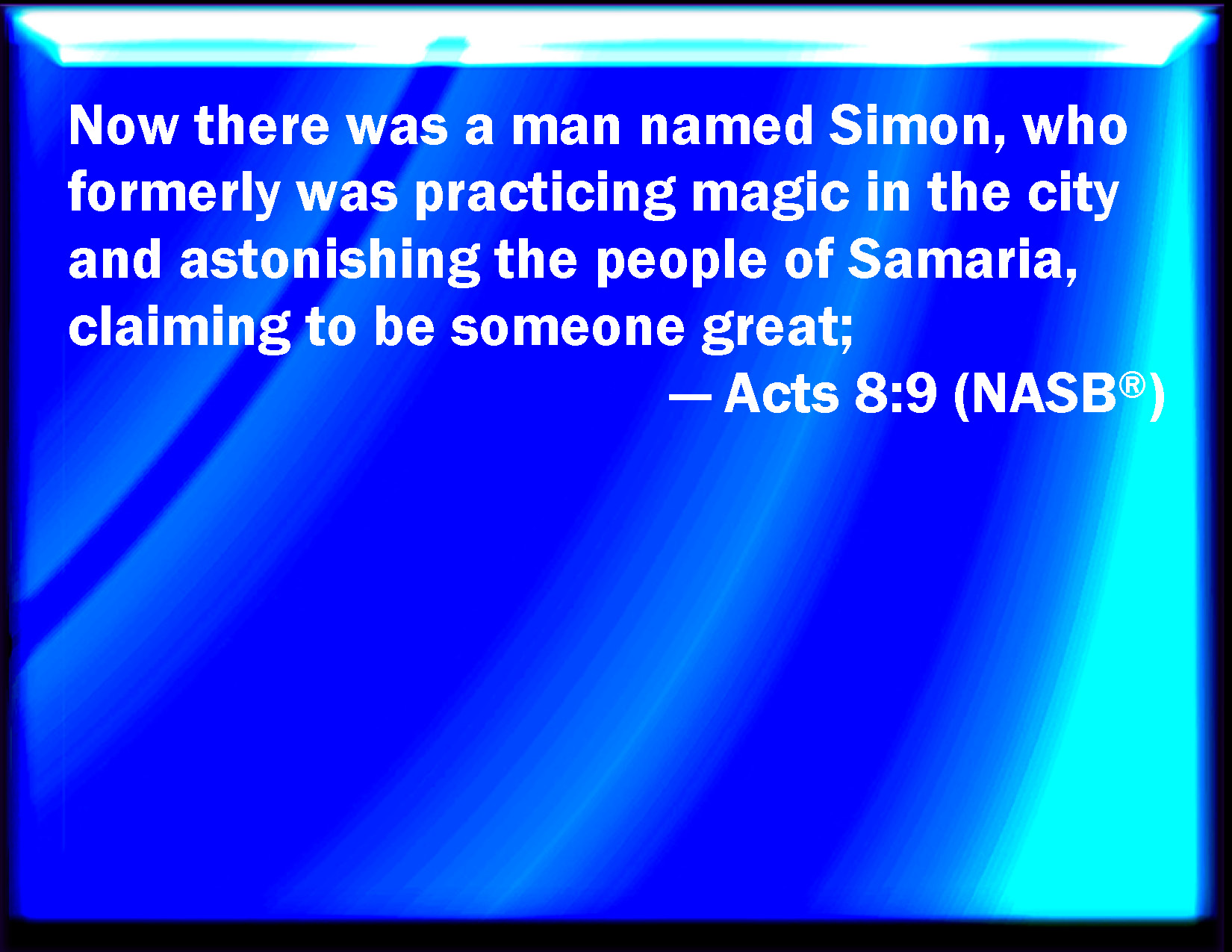

The story of Simon is archetypal of the particular challenges First Century believers faced. All of them, from the least to the greatest, paid attention to him, saying, "This man is the Power of God that is called Great." They paid attention to him because he had astounded him with his magic" ( Acts 8:9-12). The Evangelist casts Simon in an adversarial role to be conquered by the Gospel.Ī man named Simon used to practice magic in the city and astounded the people of Samaria, claiming to be someone great. Saint Jerome, in his sprawling biblical commentary, notes that Luke in Acts does not focus attention on Simon's magic but rather on the heresy itself, how the other Samaritans worshipped him. He is purposefully ambiguous in his depiction of the sorcerer's tricks - he doesn't mention the type of wizardry Simon practices - but definitive in his focus on God's salvific action.

Which is the point of Luke's story of Simon Magus in The Acts of the Apostles. The Church's response to Gnosticism has remained consistent throughout the ages: Gnostic heretics reject the truth and promote falsehoods that lead the people astray. Wright, an Anglican bishop and author of twelve books on Scripture, wrote a definitive refutation of the Judas gospel in which he acknowledged the manuscript's authenticity - not as lost scripture, but as the work of a Gnostic sect. Many fine books have been written to counter The DaVinci Code's claims, like The DaVinci Hoax by Carl Olson and Sandra Miesel. Thankfully, modern-day apologists exist to set the record straight their response to resurgent gnosticism has been swift and severe.

"Come that I may teach you secrets no person has ever seen," Jesus tells Judas at one point in the story. This "gospel" offered what National Geographic termed "new insights into the disciple who betrayed Jesus." Religious scholar Bart Ehrman, author of Misquoting Jesus, claimed this discovery would "turn Christianity on its ear." Unlike the canonical gospels, in which Judas Iscariot is portrayed as a traitor, the gnostic text depicts Judas acting at Jesus's request to hand him over to the authorities for crucifixion. One of the best ploys is to borrow authority from the Bible by claiming to have located some "lost" part of it, like the "gospel of Judas," an ancient manuscript discovered in Egypt and introduced to the world by National Geographic in 2006. "The best fiction is far truer than any nonfiction," novelist William Faulkner used to say, and well he knew the ability of the storyteller to enrapture the people with literary card tricks. Because people often believe there's truth to a fictional story, especially a wildly-popular novel like Brown's. We see it in novels like Christ the Lord Out of Egypt by Ann Rice, which depicts fictional scenes of Jesus' life based on gnostic gospels, and Dan Brown's The DaVinci Code, a runway bestseller that seeks to supplant Church teaching by advancing the unfounded assumption that Jesus was married to Mary Magdalene and that they had children. Why study heresies that purportedly died out two millennia ago? Because pop culture is rife with gnosticism. Jewish law in the Old Testament also forbad the practice of magic: "Do not turn to mediums or wizards do not seek them out, to be defiled by them: I am the Lord your God" ( Leviticus 19:31). It was from Simon Magus that we derive the term simony, the buying and selling of spirituality, a form of heresy condemned by the Roman Catholic Church, and an offense that earned Simon a place in the eighth circle of Hell in Dante's Inferno. He succeeded in luring converts away from Christianity and even fooled the Roman Emperor Claudius Caesar into erecting a statue in his honor. What sort of magic did he practice? Saint Luke doesn't tell us directly in his narrative, but Simon was said to have been able to fly and claimed to be immortal. Simon claimed to have possessed this knowledge and portrayed himself to be "the Son." He was a Samaritan and many of his countrymen confessed him to be their god. Early Church Fathers such as Iranaeus and Justyn Martyr identified Simon as the first Christian gnostic, the creator of a sect whose members believed salvation could be obtained through a secret body of knowledge handed onto them by Christ himself. Remember the story of Simon Magus? He was the magician in The Acts of the Apostles who tried to buy the power of the Holy Spirit but was rebuked by Saint Peter.


 0 kommentar(er)
0 kommentar(er)
